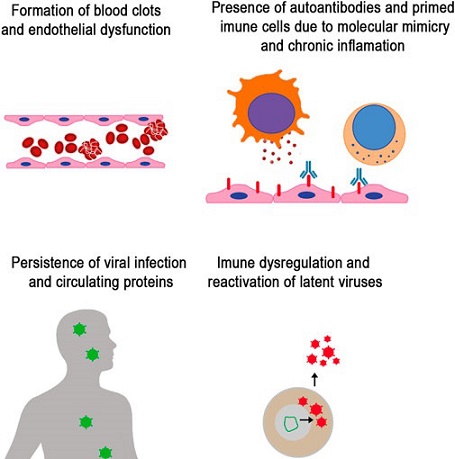Thailand Medical News Team Aug 13, 2023 2 years, 6 months, 2 weeks, 5 days, 19 hours, 37 minutes ago
Long COVID: The COVID-19 pandemic, caused by the SARS-CoV-2 virus, has had a significant global impact, affecting societies and economies worldwide. Despite extensive efforts to control the virus's spread and mitigate its effects through vaccination, concerns have arisen due to the emergence of SARS-CoV-2 variants.
 Mechanism involved in Long COVID. Studies have identified the main factor in persistent symptoms that characterize Long COVID. Mechanisms include vascular dysfunction and formation of micro clots that lead to thrombosis, immune dysregulation with increased pro-inflammatory response and autoreactive immunity driven by molecular mimicry and bystander activation of lymphocytes, the persistence of viral replication and SARS-CoV-2 proteins circulation, and reactivation of human latent herpes viruses.
Mechanism involved in Long COVID. Studies have identified the main factor in persistent symptoms that characterize Long COVID. Mechanisms include vascular dysfunction and formation of micro clots that lead to thrombosis, immune dysregulation with increased pro-inflammatory response and autoreactive immunity driven by molecular mimicry and bystander activation of lymphocytes, the persistence of viral replication and SARS-CoV-2 proteins circulation, and reactivation of human latent herpes viruses.
Some of these variants, like the Omicron variant, have demonstrated increased transmissibility and resistance to neutralization and vaccination.
While COVID-19 primarily affects the respiratory system, it can also have implications for other organs and systems, including the hematological system.
Numerous studies have highlighted hematological abnormalities in COVID-19 patients. These abnormalities, such as changes in white blood cell count, red blood cell count, hemoglobin levels, and markers of coagulation, are often associated with increased disease severity and poorer outcomes.
COVID-19 symptoms can range from mild to severe, encompassing fever, cough, shortness of breath, fatigue, body aches, loss of taste or smell, and sore throat. Notably, not all COVID-19 patients experience hematological abnormalities, and the extent of these abnormalities varies widely among patients.
Long COVID, also known as post-acute sequelae of SARS-CoV-2 infection (PASC), refers to persistent symptoms that extend beyond the acute phase of the illness. These symptoms can persist even in individuals who had mild or asymptomatic infections.
The effects of Long COVID are still being studied, but they encompass a diverse range of symptoms, including fatigue, shortness of breath, chest pain, joint pain, headaches, cognitive difficulties, loss of taste or smell, and mood disorders. Neurological issues are a predominant feature of Long COVID, but it can also lead to organ damage, affecting the heart, lungs, or kidneys.
Research has shown that factors such as age, sex, and race can influence the development and severity of Long COVID. While it affects both males and females, some studies suggest that females might be at a higher risk. Older individuals tend to experience more persistent symptoms and longer recovery periods. Certain racial and ethnic groups also exhibit variations in cognitive symptoms associated with Long COVID.
The underlying mechanisms of Long COVID remain subjects of ongoing debate. These mechanisms encompass aspects of immune response, inflammation, and autoimmune reactions. Hematological alterations have been observed in Long COVID patients, including lower hemoglobin levels and elevated D-dimer levels that can contribute to blood clotting, a phenomenon often associated w
ith Long COVID.
Long COVID is a complex condition characterized by persistent or new symptoms that extend beyond 12 weeks from the onset of acute COVID-19. These symptoms, which can be categorized as sub-acute (between 4-12 weeks) or Long COVID (beyond 12 weeks), have been associated with systemic disorders such as cardiovascular disease, cerebrovascular disease, thrombotic events, type 2 diabetes, and myalgic encephalomyelitis/chronic fatigue syndrome (ME/CFS).
Hematological alterations play a significant role in Long COVID, providing critical insights into its underlying mechanisms. Lymphopenia, a decrease in lymphocyte count, is a notable feature, possibly driven by deficient interferon production and cytokine storms. Changes in red blood cells (RBCs) are also observed, affecting parameters such as hemoglobin concentration, mean corpuscular volume (MCV), and mean corpuscular hemoglobin (MCH). Alterations in RBC structure and metabolism can impact oxygen diffusion and contribute to anemia and inflammation.
Hemoglobin levels are another key parameter affected by Long COVID. Low hemoglobin levels can lead to compromised oxygen transport and anemia, which may contribute to symptoms such as fatigue, weakness, and shortness of breath.
Iron dysregulation is a persistent feature of Long COVID, resulting in elevated ferritin levels. Ferritin, involved in iron storage and cellular oxygen metabolism, is influenced by inflammation and oxidative stress. Elevated ferritin levels are associated with the severity of COVID-19 and may contribute to oxidative stress and cell damage.
The coagulation cascade is also influenced in Long COVID, as evidenced by sustained elevation of D-dimer levels. Increased D-dimer levels are linked to thrombotic events and may contribute to the hypercoagulable state observed in Long COVID. The interaction between red blood cells (RBCs) and platelets may further contribute to thrombosis.
Cytokines, key players in the immune response, exhibit complex dynamics in Long COVID. Pro-inflammatory cytokines such as IL-6 and TNF-α are elevated, contributing to immune dysregulation and sustained inflammation.
In conclusion, Long COVID is a complex condition characterized by persistent symptoms beyond the acute phase of COVID-19. Hematological alterations are a significant aspect of Long COVID, providing insights into its underlying mechanisms and potential therapeutic targets. Lymphopenia, changes in red blood cells, alterations in hemoglobin levels, iron dysregulation, and sustained elevation of D-dimer and cytokine levels contribute to the intricate landscape of Long COVID. Further research is needed to fully elucidate the complex interactions and mechanisms underlying these hematological changes and to develop targeted interventions for Long COVID.
The study findings were published in the peer reviewed journal: Frontiers in Physiology.
https://www.frontiersin.org/articles/10.3389/fphys.2023.1203472/full
For the latest about
Long COVID, keep on logging to Thailand Medical News.
